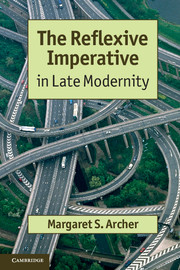Book contents
- Frontmatter
- Contents
- Figures
- Acknowledgements
- Introduction
- 1 A brief history of how reflexivity becomes imperative
- 2 The reflexive imperative versus habits and habitus
- 3 Reconceptualizing socialization as ‘relational reflexivity’
- 4 Communicative reflexivity and its decline
- 5 Autonomous reflexivity: the new spirit of social enterprise
- 6 Meta-reflexives: critics of market and state
- 7 Fractured reflexives: casualties of the reflexive imperative
- 8 Conclusion
- Methodological appendix
- Index
- References
8 - Conclusion
Published online by Cambridge University Press: 05 June 2012
- Frontmatter
- Contents
- Figures
- Acknowledgements
- Introduction
- 1 A brief history of how reflexivity becomes imperative
- 2 The reflexive imperative versus habits and habitus
- 3 Reconceptualizing socialization as ‘relational reflexivity’
- 4 Communicative reflexivity and its decline
- 5 Autonomous reflexivity: the new spirit of social enterprise
- 6 Meta-reflexives: critics of market and state
- 7 Fractured reflexives: casualties of the reflexive imperative
- 8 Conclusion
- Methodological appendix
- Index
- References
Summary
As is often the case, to come to the end of a book is to start the next one. This is so here because a small qualitative study, which cannot pretend to be representative even of university students within one institution, furnishes no basis for inferential statistics and no justification for extrapolation to the increasingly varied groups constituting the population of Britain. However, as a theoretico-empirical study, what it does provide is food for further theoretical consideration; for something between unregulated speculation and theoretical propositions warranted by empirical substantiation. In short, the findings presented have implications worth entertaining in theorizing about future transformations of the social order. Their examination is itself a response to the ‘situational logic of opportunity’, since it too involves an exploration of ‘contingent compatibilities’ that are the ultimate constituents of the increase in ‘variety’ today.
The patterns and processes involved in the making and breaking of reflexivity – the dominant mode developed, practised and sometimes fractured – amongst this small cohort of sociology students is summarized in Figure 8.1 below. These are largely qualitative findings about educated young people in late modernity. Tempting as these findings are for hypothesis formation, various forms of inference or extrapolation simply cannot be supported from the empirical work undertaken and presented in chapters 4, 5, 6 and 7: (i) from the interviewed group to the rest of the entrance cohort, because interviewees were volunteers, self-selected rather than being matched with the larger group in their composition; (ii) from the interviewees to students entering the same university at the same time to study other disciplines or courses, partly again because of self-selection but also partly because of different entry requirements and a penumbra of factors which influenced their possession; (iii) from the Warwick interviewees to those at other British universities, where the definition of sociology, desiderata for entrants, and the repute of different institutions contributed to defining different populations at point of entry; (iv) from those interviewed to the same age cohort in the British population and so forth. These are very real limitations but they do not necessarily entail the banal conclusion that ‘there is need for much further research’ and no more can be said.
- Type
- Chapter
- Information
- The Reflexive Imperative in Late Modernity , pp. 292 - 315Publisher: Cambridge University PressPrint publication year: 2012



